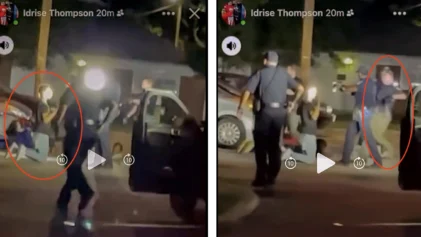The U.S. Embassy in the Dominican Republic has warned Black and dark-skinned Americans they may be racially profiled and possibly detained on the island, but officials have rejected the bulletin claiming it is unfounded and contradicts diplomatic relations.
The embassy states that in recent months U.S. citizens have reported being “delayed, detained, or subject to heightened questioning at ports of entry and in other encounters with immigration officials based on their skin color.”
The alert advises Americans with “darker skin and of African descent that they may be at risk” for increased interaction with Dominican authorities because of the country’s crackdown on undocumented migrants, especially those of Haitian descent.

“Reports of disparate treatment of U.S. citizens by Dominican authorities are a matter of ongoing concern to the U.S. Embassy,” the alert issue on Nov. 19 says.
However, the Dominican Republic’s Ministry of Foreign Affairs released a statement the next day expressing “its strongest rejection” of the U.S. embassy’s statement.
The statement contradicts “the excellent bilateral relationship that exists between the Dominican Republic and the United States in all spheres,” the ministry said.
“Our country is the first trading partner of the United States in the Caribbean and the sixth in Latin America,” the statement continues.
The ministry said the Dominican Republic has advocated for change amid the humanitarian and political crisis wracking its western neighbor on the island of Hispaniola the two nations share, but those problems also have created national security issues in the D.R.
“For several decades, the bulk of the burden has fallen, particularly in terms of migration, on our country,” the statement says.
The ministry points out that a chunk of the country’s health budget is dedicated to free medical services for foreign nationals, primarily Haitians.
The alert could also impact the Dominican Republic’s tourism industry, leading to economic downfall, it says.
“Without the support of the international community, we have made an extraordinary effort to keep the border open to allow the Haitian population access to vital food, medicine, fuel, water, etc,” the statement says.
Many Dominicans, including a diplomat in its embassy in Haiti, have been kidnapped. They have had to deploy 9,000 troops to secure the border between the two countries, it says.
The migrant situation has overwhelmed the Dominican Republic, according to the ministry, and the country “can’t take it anymore.”
The ministry also pointed out that President Joe Biden’s administration deported more than 20,000 migrants back to Haiti between February 2021 and February 2022.
The ministry also called out the U.S. for being the center of allegations of “xenophobic and racist treatment of migrants and even sectors of his own population.”
“No country has made a greater effort than the D.R., advocating for the international community to help Haiti, but we declare once again with all the necessary vigor that there is not – nor can there ever be – a Dominican solution to the Haitian odyssey,” the statement says.
Still, the Dominican Republic has deported more than 100,000 Haitian nationals this year. More than 60,200 Haitians were expelled from August to October, officials said in a tweet.
The U.S. Embassy said, “there are reports that detainees are kept in overcrowded detention centers, without the ability to challenge their detention, and without access to food or restroom facilities, sometimes for days at a time, before being released or deported to Haiti.”
Dominican Republic’s President Luis Abinader issued a decree on Nov. 12 strengthening migration enforcement and creating a new police unit to address the issue. However, the policy goes against the United Nations’ calls to halt deportations because of violence and humanitarian conditions in Haiti.
“Unremitting armed violence and systematic human rights violations in Haiti do not currently allow for safe, dignified and sustainable return of Haitians to the country. I reiterate my call to all countries in the region, including the Dominican Republic, to halt the deportation of Haitians,” said UN High Commissioner for Human Rights Volker Türk in a Nov. 11 statement.
“I also call on the Dominican Republic authorities to step up efforts to prevent xenophobia, discrimination and related forms of intolerance on national, racial or ethnic origin, or immigration status,” he continued.
However, Abinader said Türk’s remarks were “unacceptable and irresponsible.”
The Ministry of Foreign Affairs said the U.S. government has not “provided any evidence, beyond anecdotal cases without independent verification, that there is a systematic pattern of violations of the rights of migrants, ordered by the Dominican authorities.”
“Isolated cases could occur, as in any part of the world, which, if reported to the relevant authorities, would be duly investigated and punished, if their veracity were proven,” the statement continued.
However, the United Nations Children’s Agency told CNN on Monday that it has received at least 1,800 unaccompanied children delivered by Dominican immigration authorities into Haiti since the beginning of the year.
Legal immigrants told CNN they are afraid as videos of raids flood social media. Footage on Twitter shows immigration agents beating people with sticks and wooden panels and kicking and punching them.
A Haitian man who lives and works legally in the Dominican Republic told CNN agents broke into his home around 3 a.m. and arrested him.
“They did not ask me for my papers or anything; they did not let me speak,” he said. “They just grabbed me and took me away; I told them I had papers and they did not even listen.”
However, the Dominican government said it “would never have imagined such serious insinuations” would be made about a country “whose population evidences ‘in its skin color’ a wide melting pot of races.”
Still, news reports of anti-Black racism and colorism in the Dominica Republican date to the 1930s.
In October 1937, Dominican dictator Rafael Trujillo ordered the military to kill Haitians and Dominicans of Haitian descent with machetes. The executions lasted for five to eight days. An estimated 1,000 to 30,000 people were killed, NPR reports.


